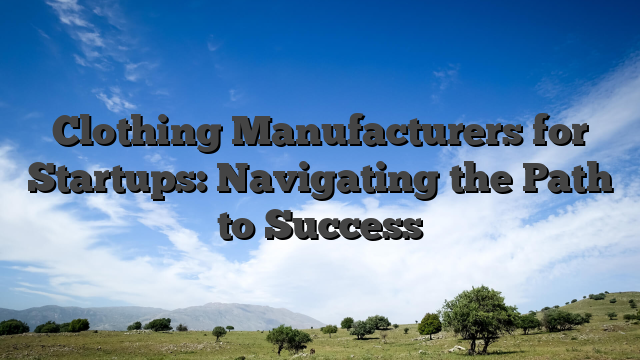Introduction
The fashion industry is a dynamic and competitive space, and for startups aiming to carve a niche, the choice of clothing manufacturers plays a pivotal role in determining success. In this comprehensive guide, we’ll explore the multifaceted aspects of working with clothing manufacturers, providing insights, strategies, and real-world examples to guide startups on their journey to success.
Understanding the Landscape
Before delving into the intricacies of clothing manufacturing, it’s crucial for startups to understand the competitive landscape of the fashion industry. Standing out in a market flooded with options requires a unique approach, innovative design, and a commitment to offering products that resonate with consumers.
Researching the Market
Market research is the compass that guides successful manufacturing decisions. By understanding trends, consumer preferences, and emerging styles, startups can make informed choices that align with market demands. Data-driven insights are invaluable in creating a product that not only meets but exceeds customer expectations.
Defining Your Brand Identity
Your brand is more than just a logo; it’s a story, a promise, and a connection with your audience. Before approaching manufacturers, startups should establish a clear brand identity that reflects their values, aesthetics, and target market. This identity will serve as a guiding light in the manufacturing process.
Identifying Manufacturing Needs
Once your brand identity is established, it’s time to identify your manufacturing needs. What types of clothing do you plan to produce? Are you targeting a specific demographic, and what are your estimated production quantities? Answering these questions will help narrow down your search for the right manufacturer.
Choosing the Right Manufacturer
Research is the foundation of selecting the right manufacturing partner. Consider factors such as experience, reputation, and production capabilities. A manufacturer with a track record of success and a commitment to quality is more likely to contribute to your startup’s success.
Quality Assurance
Quality is the hallmark of any successful clothing brand. From the sourcing of materials to the final stitching, quality assurance should be embedded in every stage of the manufacturing process. High-quality products not only attract customers but also build brand loyalty.
Cost Analysis and Budgeting
While quality is non-negotiable, startups must also navigate the financial aspects of manufacturing. Conduct a comprehensive cost analysis, including material costs, labor, and shipping expenses. Negotiate cost-effective deals without compromising the integrity of your products.
Sustainable Practices
Sustainability is no longer a buzzword; it’s a consumer expectation. Choose manufacturers that embrace eco-friendly practices and ethical sourcing. Aligning your brand with sustainability not only attracts environmentally conscious consumers but also contributes to a positive brand image.
Communication and Collaboration
Effective communication is the backbone of a successful partnership. Build open and transparent channels of communication with your manufacturing partner. Collaboration fosters creativity and innovation, leading to products that stand out in the market.
Production Timelines and Efficiency
Meeting market demands requires meticulous management of production timelines. Set realistic schedules, accounting for each stage of production, and be prepared to adapt to unforeseen challenges. Improving efficiency ensures timely delivery and customer satisfaction.
Customization Options and Flexibility
In a market saturated with options, customization sets your brand apart. Choose manufacturers that offer customization options, allowing you to adapt to changing market demands and cater to specific consumer preferences.
Legal Considerations and Intellectual Property
Navigating the legal landscape is critical in protecting your brand and creations. Clear and comprehensive contracts that outline intellectual property rights and responsibilities are essential. Ensure legal safeguards are in place to prevent potential disputes.
Scaling Your Production
As your startup grows, scaling production becomes a necessity. Develop strategies for seamless expansion, and nurture long-term relationships with manufacturers who can accommodate increased production volumes. A reliable manufacturing partner is an invaluable asset during periods of growth.
Keeping Abreast of Industry Trends
Staying updated on current trends in manufacturing and design is a continuous process. Adapting to consumer preferences and industry innovations ensures your products remain relevant and appealing to your target market.
Global vs. Local Manufacturers
The choice between global and local manufacturers depends on various factors. Consider production volume, costs, and sustainability implications. Assess the impact on shipping and production timelines to make an informed decision.
Technology Integration and Automation
Embrace technology to streamline manufacturing processes. Automation plays a significant role in enhancing efficiency and reducing production costs. Stay abreast of technological advancements in the industry to maintain a competitive edge.
Technology to streamline manufacturing processes. Automation plays a significant role in enhancing efficiency and reducing production costs. Stay abreast of technological advancements in the industry.
Case Studies
Examining case studies of successful startups can provide valuable insights. Learn from the experiences of others, understanding the challenges they faced and how they navigated them to achieve success in the competitive world of fashion.
Learning from Success:
Examining case studies of successful startups provides valuable insights. Learn from the experiences of others, understanding the challenges they faced and how they navigated them to achieve success in the competitive world of fashion.
Conclusion
In conclusion, the journey of establishing a clothing line is undoubtedly challenging, but choosing the right manufacturer can significantly impact your success. By carefully considering the outlined factors, startups can navigate the path to success in the world of clothing manufacturing. Remember, it’s not just about making clothes; it’s about crafting a brand that resonates with consumers and stands the test of time.
FAQs
How do I find the right clothing manufacturer for my startup?
Conduct thorough research, consider specific needs, and assess the manufacturer’s track record and reputation.
What role does sustainability play in clothing manufacturing for startups?
Sustainability is crucial; it not only attracts eco-conscious consumers but also contributes to a positive brand image.
How can I protect my intellectual property when working with a manufacturer?
Ensure clear and comprehensive contracts that outline intellectual property rights and responsibilities.
Is it better to work with local or global manufacturers for a startup?
The choice depends on factors like production volume, costs, and sustainability considerations.
How can technology enhance the clothing manufacturing process for startups?
Technology, such as automation, can improve efficiency, reduce costs, and streamline production processes.




